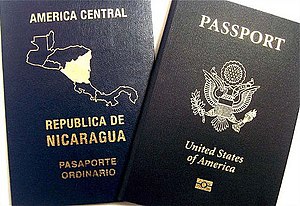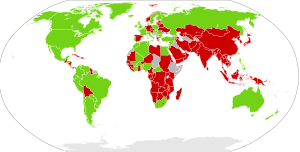| A citizen denotes a legal obligation for both the citizen and the state. (Photo credit: Wikipedia) |
Citizenship is loosely defined as the state of being a citizen of a particular
social, political, national, or human resource community. In law, citizenship
denotes a legal bond between an individual and a state. It implies a legal obligation
for both the state and the individual. This bond provides the basis for rights in a country. The type of rights the state guarantees to its citizens varies by each country. The most common are the include the right to right
to permanent residence, the right to travel or move freely within a country, the right the right of access to public services, the right to vote and to be elected or appointed to public office, the right to own land or property, and the right to invest, an the right to diplomatic protection by the state when outside the country.
It also signifies a bond that is the basis for a social relationship between the individual and the state. This includes an individual's sense of 'belonging' to the state thereby affecting the type of interaction the individual will have with the state. Under international law, citizenship is synonymous to nationality but does not imply ethnic origin; it implies the legal obligation regardless of ethnicity. According to the International Court of Justice, "nationality is a legal bond having as its basis a social fact of attachment, a genuine connection of existence, interest and sentiments, together with the existence of reciprocal rights and duties.” Defining citizenship in legal terms is therefore important because it is where a state recognizes and guarantees the individual’s rights. It is therefore important that a state has clearly defined citizenship laws that are not ambiguous. In some cases, the lack of dual citizenship has rendered individuals as stateless. A person who does not have citizenship in any state is considered stateless.
It also signifies a bond that is the basis for a social relationship between the individual and the state. This includes an individual's sense of 'belonging' to the state thereby affecting the type of interaction the individual will have with the state. Under international law, citizenship is synonymous to nationality but does not imply ethnic origin; it implies the legal obligation regardless of ethnicity. According to the International Court of Justice, "nationality is a legal bond having as its basis a social fact of attachment, a genuine connection of existence, interest and sentiments, together with the existence of reciprocal rights and duties.” Defining citizenship in legal terms is therefore important because it is where a state recognizes and guarantees the individual’s rights. It is therefore important that a state has clearly defined citizenship laws that are not ambiguous. In some cases, the lack of dual citizenship has rendered individuals as stateless. A person who does not have citizenship in any state is considered stateless.
In general, countries define
citizenship based on one's descent (often called ius soli, or sometimes
jus
soli - "right of the soil"), place of birth (often called jus
sanguinis - "right of the blood"), or acquisition (marriage, and/or
naturalization). That is, you might be a citizen of a given country for one or
more of the following reasons:
Birth:English: Citizenship based on jus soli around the world (Photo credit: Wikipedia) - You were born on territory belonging to, or claimed by, that country.
- Descent:
- One or both of your parents were citizens of that country.
- Acquisition:
- You married a citizen of that country through a legal process of registration (commonwealth countries), option/declaration (civil-law societies). The the practice of granting immediate, automatic citizenship to a foreign spouse is far less common today than it was decades ago.
- You (or one or both of your parents or grandparents) obtained that country's citizenship by going through a legal process of naturalization.
| English: Countries by their ideals of Multiple (Dual) citizenship. Granted Ungranted Data not available (Photo credit: Wikipedia) |
Determination of citizenship status can be a difficult and lengthy process as there does not exist and Application for Dual citizenship” or a “Certificate” issued confirming that you hold dual citizenship. It can also be further complicated by ambiguous laws on dual citizenship.
Source (s): Manyika, Grace "Campaign for Dual Citizenship in Malawi", Kachipande, Sitinga "Nation Branding Through Citizenship: Engaging the African Diaspora", Manby, Brownen "Citizenship Law in Africa: A Comparative Study", U.S. State Department, Rich Wales , Wikipedia




No comments:
New comments are not allowed.